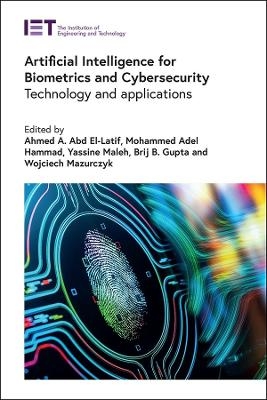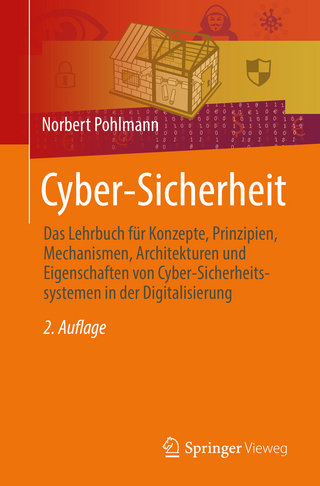
Artificial Intelligence for Biometrics and Cybersecurity
Institution of Engineering and Technology (Verlag)
978-1-83953-547-5 (ISBN)
- Titel nicht im Sortiment
- Artikel merken
The integration of new technologies is resulting in an increased demand for security and authentication in all types of data communications. Cybersecurity is the protection of networks and systems from theft. Biometric technologies use unique traits of particular parts of the body such facial recognition, iris, fingerprints and voice to identify individuals' physical and behavioural characteristics. Although there are many challenges associated with extracting, storing and processing such data, biometric and cybersecurity technologies along with artificial intelligence (AI) are offering new approaches to verification procedures and mitigating security risks.
This book presents cutting-edge research on the use of AI for biometrics and cybersecurity including machine and deep learning architectures, emerging applications and ethical and legal concerns. Topics include federated learning for enhanced cybersecurity; artificial intelligence-based biometric authentication using ECG signal; deep learning for email phishing detection methods; biometrics for secured IoT systems; intelligent authentication using graphical one-time-passwords; and AI in social cybersecurity.
Artificial Intelligence for Biometrics and Cybersecurity: Technology and applications is aimed at artificial intelligence, biometrics and cybersecurity experts, industry and academic researchers, network security engineers, cybersecurity professionals, and advanced students and newcomers to the field interested in the newest advancements in artificial intelligence for cybersecurity and biometrics.
Ahmed A. Abd El-Latif is an associate professor of computer science at Menoufia University, Egypt, and at EIAS Data Science Lab, College of Computer and Information Sciences, Prince Sultan University, Saudi Arabia. He has 17 years of experience and has published 260+ papers and authored 10 books with 8650+ citations. He is a top 2% scientist and has received numerous awards. His research interests include cybersecurity, 5G/6G wireless networks, post-quantum cryptography, and artificial intelligence applications. Mohammed Adel Hammad is an assistant professor in the Faculty of Computers and Information at Menoufia University, Egypt. He has published more than 50 papers in international SCI-IF journals and is listed in the top 2% of scientists in Stanford University rankings. He has served as an editor and board member in PLOS ONE and BMC Bioinformatics journals. His research interests include biomedical imaging, cyber security, IoT, AI, pattern recognition, and biometrics. Yassine Maleh is an associate professor of cybersecurity and IT governance at Sultan Moulay Slimane University, Morocco. His research covers information security and privacy, internet of things security, wireless and constrained network security and IT governance. He has published over 70 papers, 10 edited books and 3 authored books. He is editor-in-chief of the International Journal of Information Security and Privacy. Brij B. Gupta is the director of the International Center for AI and Cyber Security Research and Innovations and full professor with the Department of Computer Science and Information Engineering (CSIE), Asia University, Taiwan. He has 18 years of experience and has published 500 papers, authored 35 books and has 21,000+ citations. He is a top 2% scientist and has received numerous awards. His research interests include artificial intelligence, cyber-physical systems, and blockchain technologies. Wojciech Mazurczyk is a professor at the Institute of Computer Science and Head of the Computer Systems Security Group (CSSG) in the Faculty of Electronics and Information Technology, Warsaw University of Technology (WUT), Poland. He is an accredited cybercrime expert, trainer and a member of the Academic Advisory Network for Europol EC3 (European Cybercrime Center), and founder and coordinator of the Criminal Use of Information Hiding (CUIng) Initiative launched in cooperation with Europol EC3.
Chapter 1: Introduction
Chapter 2: AI in biometrics and cybersecurity
Chapter 3: Biometric security performance: analysis methods and tools for evaluation and assessment
Chapter 4: Leveraging generative adversarial networks and federated learning for enhanced cybersecurity: a concise review
Chapter 5: A survey on face recognition methods with federated leaning
Chapter 6: Artificial intelligence-based biometric authentication using ECG signal
Chapter 7: A comparative analysis of email phishing detection methods: a deep learning perspective
Chapter 8: Securing hardware coprocessors against piracy using biometrics for secured IoT systems
Chapter 9: Intelligent authentication system using graphical one-time passwords
Chapter 10: Role of AI in social cybersecurity: real-world case studies
Chapter 11: Ethical and privacy concerns and challenges
Chapter 12: Conclusion
| Erscheinungsdatum | 04.11.2023 |
|---|---|
| Reihe/Serie | Security |
| Verlagsort | Stevenage |
| Sprache | englisch |
| Maße | 156 x 234 mm |
| Themenwelt | Informatik ► Netzwerke ► Sicherheit / Firewall |
| Informatik ► Theorie / Studium ► Kryptologie | |
| Informatik ► Theorie / Studium ► Künstliche Intelligenz / Robotik | |
| ISBN-10 | 1-83953-547-4 / 1839535474 |
| ISBN-13 | 978-1-83953-547-5 / 9781839535475 |
| Zustand | Neuware |
| Haben Sie eine Frage zum Produkt? |
aus dem Bereich


